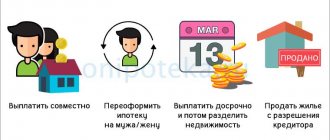Many citizens who want to take out an apartment on a mortgage cannot save money for a down payment. In order not to make a down payment, some buyers collude with the seller and artificially inflate the cost of the apartment being sold. Let's consider what overpricing an apartment with a mortgage is, what risks it carries for the seller and buyer, and whether it is profitable to do so.
Why inflate the value of real estate with a mortgage?
As mentioned above, the main reason why the parties resort to a transaction with an inflated value of real estate is the buyer’s lack of money for a down payment. Often this is no less than 20% of the cost of the apartment, which in large cities is a significant amount. It is in such situations that the need arises to inflate the cost of the property, get a loan and cover all expenses.
Another reason why people take out an overpriced mortgage is to buy an apartment without renovation. In this situation, borrowers often request a larger amount from the bank than is necessary for its purchase, and spend the remaining funds on home repairs.
Or the third option. The buyer simply needs cash for personal needs - purchasing a car or traveling.
It is the above reasons that push borrowers to take overpriced mortgages. This is not entirely fair and legal, but everyone gets their own benefit.
Inflating the cost of an apartment with a mortgage
Mortgages that inflate the cost of an apartment attract borrowers who are unable to pay the down payment. The overpriced scheme allows you to obtain a loan on more favorable terms.
The essence of an overpriced mortgage: the buyer agrees with the seller to increase the cost of the apartment under the purchase and sale agreement. The amount is inflated by the amount of the down payment on the mortgage. The borrower uses the difference for his own purposes, usually making the first loan payment to the bank.
After registering the transaction, the bank pays the seller the remaining amount, that is, the real cost of the apartment. This scheme is illegal and is associated with certain risks for the buyer and seller.
Why do they inflate the value of real estate with a mortgage?
Overpriced mortgages attract borrowers for various reasons. The main motive is there is no money for a down payment. And someone wants to use the difference between the fictitious and real cost of housing for other purposes.
Other reasons for overpricing:
- make repairs in the apartment;
- pay off utility debts;
- spend on current expenses.
The difference between the real and actual cost is spent on the down payment. Photo: primeni.ru
Cadastral and market value: what is the difference?
Any property has 2 prices:
- Cadastral.
- Market.
The market price is the real, objective cost of the apartment. It depends on renovation, location, infrastructure, etc. This figure is also influenced by the general state of the real estate market and the competitiveness of housing: the first floor is cheaper than the rest, and other similar “rules”.
Cadastral price is the amount that is used to calculate property taxes. It is always below the market price. What is beneficial for the owner is that he pays less taxes. The cadastral value depends on the region where the housing is located. Each region has a certain coefficient that is used to calculate the price per square meter.
When obtaining a loan to purchase an apartment, it is important to know exactly its market value. It is she who is being overestimated.
How does overstatement work for a mortgage?
The easiest way to understand the mechanism of overestimation is with an example.
Boris wants to buy an apartment from Victor with a mortgage, but the bank requires a down payment of 20%. The buyer does not have that kind of money, and he plans to receive the missing amount as part of the loan itself.
To do this, Boris negotiates with Victor against a receipt stating that he has already allegedly transferred the amount of the first installment to him. It is best to draw up such agreements under the guidance of a lawyer. Otherwise, you may suffer from fraudulent activities on both sides.
At the next stage, Boris contacts an appraisal company and negotiates with the appraiser to inflate the value. Next, he submits the appraisal report and receipt to the bank, thereby proving that he has fulfilled the conditions for the down payment. Now he needs to wait for bank approval and get a mortgage. Finally, the parties draw up a purchase and sale agreement and conclude a deal.
How is the value of real estate assessed with a mortgage?
You have carefully studied the market and chosen a suitable apartment to purchase with a mortgage. Please note that the bank will not limit itself to verbal information about the cost of the selected home. In addition to other documents, the lender will require an apartment appraisal report.
The report looks like a bound A4 album. The document is prepared by a specialist from the appraisal company. Please note, the company or licensed appraiser must be accredited by your bank.
Main points of the assessment report:
- infrastructure of the area in which housing is purchased;
- condition of the house and apartment (color photographs are attached);
- comparative analysis of similar offers on the market;
- the cost of the property;
- other.
This and other information contained in the assessment report is necessary for specialists to draw an objective conclusion about whether it is profitable for the bank to lend to you.
The costs of the appraiser's services and the preparation of the report are paid by agreement of the parties. It happens that the seller is involved in the assessment, for example, if an apartment is purchased with an unapproved redevelopment.
The report specifies all data sources used for the procedure.
When is it better not to overstate?
Such a scheme is questionable and cannot guarantee complete security for either party. Both the buyer and the seller must understand what they are getting into. This is especially true for the buyer, because he risks a little more.
There are 3 reasons that should stop you from making an overpriced transaction:
- The buyer does not have a stable income. This risks the fact that if an unfavorable situation occurs, he may not be able to pay the mortgage. The bank will take away the housing, and if the scheme is discovered, you may find yourself under investigation.
- The buyer has not established a trusting relationship with the seller. This is a complex psychological aspect. In matters such as real estate and money, you should hardly trust anyone other than your immediate family.
- The buyer chose an expensive apartment that is difficult to compare with competitors. In such a situation, the appraiser will most likely not agree to give a knowingly false report, because the deception here will be too obvious.
Buyer's risks when the mortgage is overstated
Taking out a mortgage on an apartment without investing any of your own funds into it is profitable and convenient. But remember that a scheme to inflate the cost of an object is illegal. This means that it has its own quite significant risks. Both sides take risks, but now let’s talk about what risks the buyer bears.
Risk 1. They will refuse a mortgage and blacklist you
Do not think that financial institutions are not aware of such fraud. When studying documents, bank specialists will definitely pay attention to the significant difference between the cadastral and market values.
Expert opinion
Alexander Nikolaevich Grigoriev
Mortgage expert with 10 years of experience. He is the head of the mortgage department in a large bank, with more than 500 successfully approved mortgage loans.
The mildest punishment that awaits the buyer is refusal of a loan. Then the buyer is blacklisted. Do not forget that banks transmit information about unscrupulous borrowers to the Credit Bureau, and in the future you will not be able to take out a loan from this or any other financial institution.
Risk 2. The seller will not return the overstated amount.
The bank transfers the entire value of the property to the seller. He, in turn, must give a certain part to the buyer. In this regard, situations may arise when the apartment owner simply refuses to do this. Therefore, it is necessary to draw up a receipt for the refundable amount. She won’t go to the bank, but she will protect the buyer.
Risks for the buyer
The buyer must understand that artificially inflating the cost of an apartment to obtain a mortgage loan without making an initial deposit of funds is an illegal operation. In this regard, the following risks are noted directly for the buyer:
- Refusal to formalize a debt agreement and blacklisting - banking companies employ specialized employees who can identify fraud by comparing the cadastral and market value of real estate;
- Refusal to return excess funds on the mortgage from the seller - if you want to receive additional cash on the mortgage, you must take into account that the entire amount is transferred to the seller. He may act in bad faith and not return the money;
- If the fact of providing knowingly false documents is revealed, there is a possibility of opening a criminal case.
Risks of an overvalued mortgage for the seller
An overpriced deal is much more beneficial to the buyer. The seller does not receive any objective benefits from such an agreement. In such a situation, he risks more than he wins. Let's consider the seller's risks with a mortgage with an overstated cost of the apartment.
Risk 1. Pay the full amount under the purchase and sale agreement if the transaction is declared invalid
For certain reasons, a transaction may be considered void and terminated. The reasons for this outcome may be violations of the property rights of incompetents or minors who were previously registered in this apartment.
Expert opinion
Alexander Nikolaevich Grigoriev
Mortgage expert with 10 years of experience. He is the head of the mortgage department in a large bank, with more than 500 successfully approved mortgage loans.
If a transaction is declared invalid, there will be a two-way restitution - a process that returns both parties to their original positions. That is, the seller will receive his apartment back, and the buyer will receive money in the amount specified in the sales agreement. If it was inflated, then the seller will have to give back exactly this inflated amount.
Risk 2. You will lose time if the buyer is denied a mortgage
Banks rarely issue loans in the amount of 100% of the cost of housing. As a rule, this is 80-90% of the price that expert appraisers will determine in their report. Even if the buyer agrees with the appraiser on the overstatement, the bank may draw attention to the significant difference between the market and appraised value and refuse the mortgage.
In such a situation, the seller will lose time, since he will be constrained by the terms of the preliminary agreement with the buyer.
Risk 3. You may become an accomplice to fraud.
As mentioned earlier, it is difficult to unambiguously understand such transactions and say who was to blame and who was not. Therefore, you can only buy an overpriced apartment with the consent of both parties. Both sides will be punished accordingly.
Risk 4: Pay more taxes if owned for less than 5 years
The law obliges all sellers who have owned real estate for less than 5 years to pay a tax of 13% of the value when selling it. If you overestimate the latter, then the tax amount will be higher. It is unlikely that it will be possible to resolve this issue with the buyer.
Risk 5. The buyer will demand the advance payment back
There is a risk that the receipt for the down payment amount will not be drawn up correctly. If the mortgage is rejected, the buyer can demand the seller return the non-existent advance. This is usually at least 20% of the cost of the apartment.
Expert opinion
Alexander Nikolaevich Grigoriev
Mortgage expert with 10 years of experience. He is the head of the mortgage department in a large bank, with more than 500 successfully approved mortgage loans.
The risks of an overpriced transaction are real and very unpleasant. Participation in such schemes sometimes leads to disastrous consequences, which is confirmed not only by the reviews of victims, but also by judicial practice. Therefore, you should not use such dubious schemes; it is better to carefully study the lending conditions of various banks and find one that provides a mortgage without a down payment.
Risks for the seller
Obtaining an “overstated” mortgage involves indicating in the documents the value of the property higher than the actual amount received, and often the amount of overstatement can be quite significant. Of course, if the seller has owned the property being sold for more than 5 (five) years, this does not matter, and it will not matter at all what exactly the sales amount will be included in the contract.
But if the apartment (house) has been owned by the seller for less than 5 (five) years, this will require the payment of increased income tax.
Using an example, it will look like this: the seller bought an apartment 3-4 years ago for 1 million rubles. When selling it, he increased the price by the amount of repairs made and set the price at 1,200,000 rubles. But the buyer takes out an overpriced mortgage, and the amount is 2 million rubles, which will appear in the purchase and sale agreement.
In this case, the seller must pay income tax, since he owned the property for less than 5 (five) years, in the amount of 13%. However, the amount on which the tax is calculated is not the sale price, but the difference between the amount for which the seller himself bought the apartment and the amount of the current sale. That is, in this situation, the seller will have to pay 13% of 1 million, namely 130,000, instead of the 26,000 that he would have paid with the 200,000 that he added to the cost.
Of course, if this issue is discussed in advance with the buyer and settled, secured with receipts on paper, you can agree to such transactions, but only if the buyer is ready to compensate for the amount of tax (excess).
In any case, the seller risks little here, since the buyer will not be able to deceive him, because the bank will independently transfer the entire cost of the transaction specified in the contract to the seller’s account, and the seller himself will give the buyer the excess part of the amount.
How to reduce risks?
The easiest way to reduce risks is to avoid agreeing to dubious schemes. Neither the buyer nor the seller knows what is in the other's head. Maybe the seller was initially looking for a buyer who needed to close the deal at an inflated price in order to profit from it. Or maybe it's quite the opposite. Unfortunately, no matter how the situation turns out, it will be difficult for the law to protect someone who signed the papers in their right mind and sober memory.
It is very important to try to protect yourself from unfavorable situations. And one of the options for such protection is a safe deposit box. There you can not only leave funds until you take ownership, but also freeze the money until all the terms of the contract are met.
Another option to reduce risks is to carry out all transactions only by bank transfer. After all, the transfer of funds from the buyer’s current account to the seller’s account is direct evidence that exactly the same amount was paid/received.
A step-by-step scheme for a safe overpriced mortgage transaction
Statistics say that approximately 3 out of 10 overpriced transactions are successful. This is because today the real estate market is so unpredictable and diverse that even the most daring figures in the cost of an apartment do not surprise appraisers and they are ready to put their signature on them.
An overpriced transaction consists of 7 steps:
- A suitable object is selected. It is better if it has only one owner. Otherwise, you can seriously complicate the situation with minor children, incompetents, etc. Let the real cost of the apartment be 2.6 million rubles.
- Next, you need to agree with the seller to record the inflated cost of housing in the documents. The buyer and seller sign a bilateral advance agreement for 650 thousand rubles (down payment 20%), indicating that the final cost of the apartment is 3.25 million rubles.
- The seller issues a receipt stating that he has received an advance in the amount of 650 thousand rubles.
- Now it is necessary to agree with experts so that they value the apartment at 3.25 million rubles. Let us immediately note that it is at this stage that everything can go wrong, since the assessment is often carried out by organizations that cooperate with the bank on an ongoing basis. Not all appraisal organizations will take such a risk. If the fraud is revealed, the bank will no longer cooperate with the company, and it will lose its source of profit.
- The buyer submits to the bank: an agreement with a value of 3.25 million rubles stated in it, an appraisal report where the apartment costs the same 3.25 million, and a receipt stating that he gave the required amount of the down payment to the seller.
- Next, it is necessary to formalize an agreement between the buyer and seller on the transfer of the advance payment.
- The bank approves the application, but issues, as is expected in such cases, only 75-80% of the value of the object. Which in our example is 2.6 million, or the real cost of the apartment.
How and to whom is the down payment transferred?
Each bank offers its own schemes. But in any case, the money must be on hand before concluding a purchase and sale agreement and a loan agreement. For example, if we consider the most popular bank in the Russian Federation - Sberbank, it offers mortgage borrowers two schemes:
After approval of the property, the borrower independently transfers the amount of the down payment to the seller in cash or by bank transfer. At the same time he receives a receipt from him.
Use of a special bank account for secure payments. According to the terms of the agreement, the PV is placed in a special account, from where it will be transferred to the seller after the borrower receives ownership rights. This type of Sber service costs 3,400 rubles.
So, check the methods of transferring the first mortgage payment in a particular bank, they are different for each. But in any case, it turns out that the buyer receives the money in parts - separately PV and separately the remaining amount from the bank after the transaction is fully completed.
Which banks operate under the scheme of inflating the value of real estate?
Today there are a lot of banks on the Russian market, so they operate in conditions of fierce competition and struggle for every client. Such conditions have led to the emergence of banks that are loyal to overvalued transactions.
Such financial institutions include:
- Sberbank.
- Raiffeisen Bank.
- VTB.
- Promsvyazbank.
- Rosselkhoz.
- AK Bars.
- Russian capital.
- Opening.
- Transcapitalbank.
- Metallinvestbank.
Expert opinion
Alexander Nikolaevich Grigoriev
Mortgage expert with 10 years of experience. He is the head of the mortgage department in a large bank, with more than 500 successfully approved mortgage loans.
It is important to understand that even if you decide to contact one of these banks and carry out an overpriced transaction, the deviation from the real market price should not be more than 20%. Anything more is too suspicious and it’s unlikely that anything other than refusal awaits you.
Do appraisers inflate the cost of an apartment in 2021?
Realtors and banking sector specialists note that overpriced transactions were especially popular before 2008. Now their number has decreased due to the fact that financial institutions have seriously tightened control over appraisers. Now each bank has its own accredited companies that evaluate real estate.
Banks believe that in order to exclude cases of overvaluation, the appraisal should be ordered by the bank itself, and not by the buyer. There are several financial institutions that use this particular scheme.
Expert opinion
Alexander Nikolaevich Grigoriev
Mortgage expert with 10 years of experience. He is the head of the mortgage department in a large bank, with more than 500 successfully approved mortgage loans.
Sometimes overstatement can occur without any collusion with clients. As an example: when a buyer is looking for a home, he usually starts his search by looking at the most affordable options. This means that these are the apartments that are sold first when they leave the market. The result of this phenomenon is that appraisers focus on apartments at higher prices. Such an overstatement does not threaten the expert in any way.
The bank will issue a loan based on the value that the appraiser will reflect in his report. Significant differences between the cadastral and reporting values will arouse suspicion from the bank. An appraiser who is found to be colluding with a buyer may lose his or her license.
As you can see, such a scheme with inflated housing costs carries risks for all persons involved in it.
How to get a mortgage without a down payment?
The chance to purchase an apartment with a mortgage without paying a down payment is provided under certain conditions. As a rule, these are preferential conditions for certain groups of the population - state employees.
Inflated housing costs
This method allows you to take out a mortgage on real estate at market value, and not at high annual interest rates. How it works?
- The client asks the seller to inflate the cost of the apartment in the purchase and sale agreement. Afterwards, a receipt is written stating that the seller has received from the buyer the required amount, equal to the difference between the actual, original cost and the inflated one, like the down payment.
- The buyer also writes a receipt stating that he borrowed this amount from the seller.
- The buyer comes with the seller’s receipt to the bank, after which he can enter into a mortgage agreement, and he pays the seller the actual cost of the apartment.
IMPORTANT! Many banks are actively fighting against overpricing in contracts. If the value is overestimated, a problem may arise with an independent real estate appraiser. The buyer is at risk, because when checking the assessment, the bank has the right to refuse a mortgage, and when approving the transaction, it will do so at a cost much less than desired.
Conditions
To take out a mortgage without a down payment, banks put forward certain requirements.
- Age from 18 to 35 years at the time of completion of payments.
- Minimum work experience of 3 months.
- Income level - mortgage payment should not be more than 40% of salary.
- Limit on other loans.









